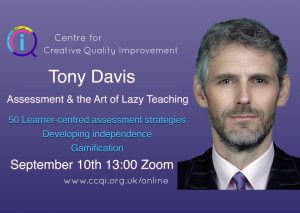Assessment & the Art of Lazy Teaching

What do you think of this line in the Ofsted Education Inspection Framework:
“Leaders understand the limitations of assessment and do not use it in a way that creates unnecessary burdens for staff or learners.”
My own feeling is that this is symptomatic of a very poor understanding of assessment, and comes from that well-worn, but misleading phrase: Teaching, Learning & Assessment.
When you think carefully about the implied chronology of TLA, it says: we teach, they learn, and then we check what they’ve learnt. Trouble is, when in that final position, ‘assessment’ is so often a summative process. In other words, it simply ‘checks understanding’. The only place for summative assessment is when learners are just about to leave or at the end of a unit they won’t be returning to.
Assessment for learning, or formative assessment, or informative assessment is something quite different. This is what we’ll be looking at in Friday’s session: Assessment & the Art of Lazy Teaching. [More details and booking details here: www.ccqi.org.uk/assessment-art.
And while I’m on my hobby horse, I have issues with Gagné’s Nine Levels of Learning too. No, this isn’t a tangent.. Level 7 is ‘Provide feedback’ and level 8 is ‘Assess performance’. So what’s my beef here? It’s the question about whether we want our learners to be dependent on us, or be able to learn independently of us. Should plan ‘A’ really be for us to assess learners and tell them what they should do to improve? In countless Ofsted reports this is exactly the criticism that inspectors make: ‘Teachers do not provide learners with sufficient feedback on how to improve their work’. Google it. You’ll see it over and over.
Surely plan ‘A’ should be to work tirelessly to develop our learners’ understanding of quality (as set out in their qualification and as understood by their expert tutors), and to equip them with the critical reflection skills needed to enable them to objectively assess their own work, then ‘edit’ it as required. This way, the provenance of their work remains their own. Our job, then, is to oversee that whole process and continually assist with the development of their skills. We need to avoid ‘learned dependence’ at all costs.
My son is working as a graduate teaching assistant at a London university at the moment as he completes his Masters. His summer role was to help all of the learners who failed during the year. They all want him to just tell them what to do. Personally, I don’t think they’ll make great engineers if he does. It’s a sad indictment for FE, don’t you think?
This Friday, in the Assessment & the Art of Lazy Teaching, we’ll be exploring 50 different formative assessment strategies, none of which are about the teacher asking more questions or marking more work. They’re all learner-centred.
Do join us if you can, or forward this on to someone who might be available. It’s always an absolutely fascinating process. Here are some of the comments from previous delegates to give you a flavour of the potential impact:
- “This is the first training session in a very long time that I have come away feeling excited and motivated. It has reminded me why I do this job and given me the inspiration to make a real difference within the classroom. Thank you.” B-Skill Limited
- “A whirlwind of excitement of new ideas.” Coleg Cambria
- “It is like taking a lift to better practice.” East Coast College
- “This is a whole new world of assessment, shinning, shimmering, splendid – a dazzling place I never knew.” Grimsby Institute
#FE #assessment #c4cqi #JoyFE #UKFEchat #Tony Davis




Comments
No comments yet